
Enterprises in Germany, Switzerland, and Austria operate in a unique environment. Strict regulations, like FADP and GDPR, carry personal liability for executives, while cultural expectations command precision and thorough documentation. Most best software development company lists you’ll find online tend to ignore this context, so the companies they choose won’t fit DACH businesses.
But we took a different approach.
In this article, we evaluate the best full-cycle software development companies in Europe based on criteria relevant to DACH business environments.
As a software development company that's been on the DACH market since 2013, we at Modeso know what DACH enterprises value most. Here are the five criteria we used to assess each company and why they matter.
→ Why it counts: Cultural misalignment is the silent project killer. You don’t have months to clarify requirements or redo deliverables if the partner doesn’t understand local business.
→ What we evaluated: Physical presence in DACH (not just remote teams), native German speakers managing projects, track record with DACH enterprise clients, and understanding of local business practices.
→ Why it counts: In DACH countries, FADP and GDPR violations can result in heavy fines and legal consequences for companies. That’s why partners without deep compliance can come at a high price.
→ What we evaluated: Data residency guarantees (Swiss/EU data centers), certifications (ISO 27001, SOC 2, industry-specific), compliance-by-design methodology.
→ Why it matters: Having an extra pair of hands is not enough. The right partner drives the project from start to finish.
→ What we evaluated: Presence of product owners and project managers, full-cycle capabilities, and average client relationship length.
→ Why it matters: DACH enterprises can't sacrifice speed to compliance. The best full-cycle software development companies deliver through proven methodologies and senior teams.
→ What we evaluated: Time-to-market metrics, methodology maturity, team seniority, and ability to deliver quickly despite regulatory pressure.
→ Why it matters: The cheapest bid often becomes the most expensive project through hidden costs. That’s why enterprises should consider the total cost of ownership, not hourly rates.
→ What we evaluated: Total cost of ownership considerations, cost-efficiency mechanisms (hybrid models, reusable frameworks), value indicators beyond rate, like speed, quality, and compliance inclusion.
We’ll start with Modeso, as we know our company best. We apply the same evaluation framework to every competitor. This way, you will see if our DACH-focused perspective matches your needs. If it does, the criteria are relevant for your decision. If not, you’ll know quickly this list isn’t for you. Either way, we’re judged by the same standards as everyone else.
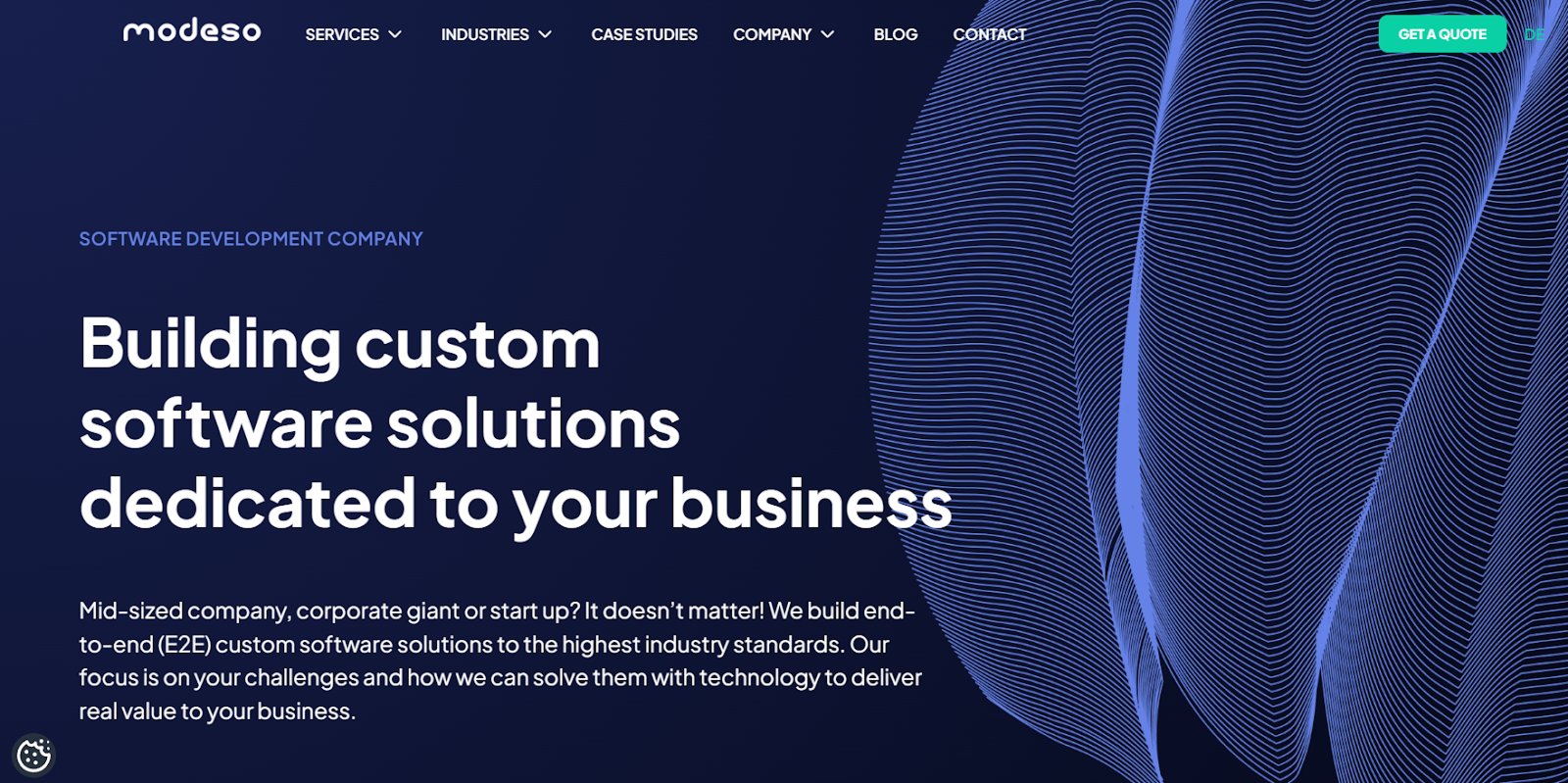
Modeso is a Swiss-based technology partner with proven technical depth for full-cycle projects. Here’s what we can help you build, scale, or fix (if needed):
End-to-end software solutions development: We cover every stage of the software development process, including alignment workshops, user-centric design, lean software development, and continuous maintenance and support.
Legacy software: At Modeso, we modernize outdated systems into scalable solutions with minimal business disruption.
Scalable SaaS: We can develop an intuitive SaaS platform that supports updates, adapts to change, and easily scales as your business grows.
Software integration: Modeso offers system integration services and develops RESTful APIs for secure access to the app’s data and functionality.
Digital transformation: We help you digitize your core business processes to cut operational costs, automate decision-making, and maintain regulatory compliance.
Generative AI development: We deliver custom AI solutions at more competitive costs compared to others in the market.
Our clients usually start with a pilot project that keeps investment low, measure key performance results, and then scale the solution. For gen AI projects, we use the LangChain framework to implement RAG, which helps reduce project workload and overall costs. In case you need the exact numbers, we’ve analyzed how much gen AI costs, so enjoy your read.
Cultural alignment & DACH presence: Our product owners are based in Zurich and speak German, so we can sit down with you in person and solve issues quickly. Big names like TWINT, Visana, and Albin Kistler trust us, and most clients stay with us for 7+ years.
Regulatory compliance capability: We design every project with compliance at the core. All data stays within DACH borders, adheres to GDPR and FADP, and meets industry-specific regulations in finance, healthcare, and manufacturing.
Project ownership model: Modeso takes full end-to-end responsibility for your project, from strategy and design to development, deployment, and maintenance. Our product owners lead delivery, provide complete accountability, and manage IP transfer and detailed documentation after the project is complete.
Speed & delivery methodology: Modeso achieves 30% faster time-to-market with a full-cycle development methodology. We begin with MVPs to prevent costly rework and then use a milestone-based approach to shorten release cycles and reduce risks.
Cost structure & value: Our project owners are in Zurich, which means we speak DACH. But we also have tech hubs in Egypt. Developers there handle software development, quality assurance, and DevOps. This way, we deliver high-quality digital products at a competitive cost.
Our clients won’t lie: 97% are happy with our services. Why? Because our projects drive impact. For example, we’ve helped 1LIMS build a comprehensive Laboratory Information Management System that brought them 30 enterprise customers across the globe.
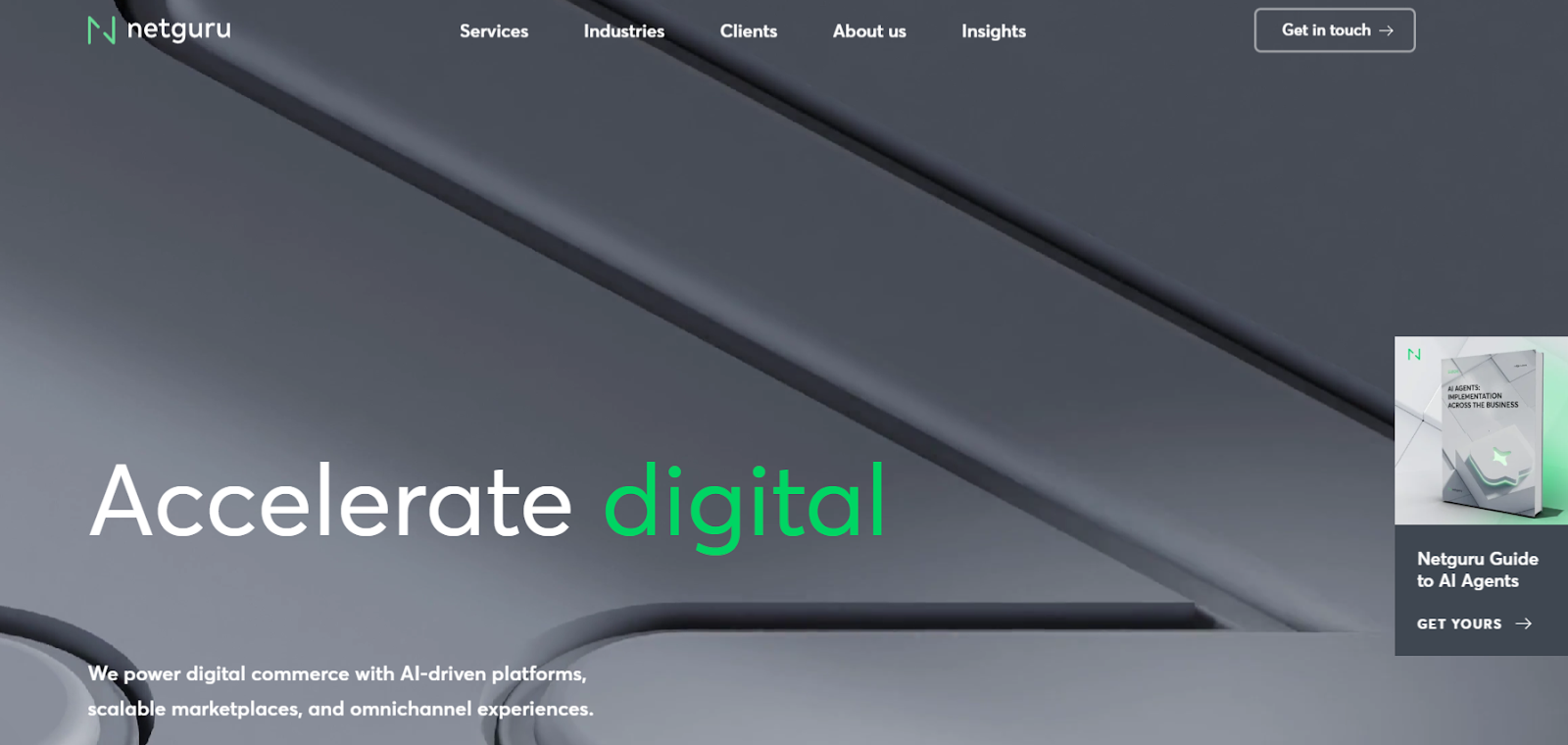
Netguru is a European digital product design and development company with over 400 people on board. Since 2008, the company has been serving scale-ups and enterprises in fintech, healthcare, and e-commerce. They provide custom software development, product design, digital transformation, AI solutions, IT consulting, and cybersecurity services. Netguru has delivered 2500+ projects for over 600 clients worldwide.
Cultural alignment & DACH presence: Netguru doesn’t have dedicated physical offices in the DACH region, but they have clients there, like Moonfare, Finstreet, and UBS.
Regulatory compliance capability: The company holds ISO 27001 certification and has strong GDPR expertise. They follow industry best practices and standards, including PCI-DSS, OWASP, CIS, and ISO.
Project ownership model: Netguru provides dedicated product managers, business analysts, and design leads who take accountability for outcomes.
Speed & delivery methodology: Netguru doesn’t outline a specific delivery framework or promise exact timelines, but one of their case studies shows they’ve built an MVP in only 5 weeks. Their teams work in Agile 2-week sprints and can react fast if needed.
Cost structure & value: Netguru’s portfolio is pretty broad. They’ve built a multi-layered KYC solution for a fintech app, developed a scalable mobile app for a global e-commerce platform, and more. Their projects include AI-driven solutions and custom-built AI agents to support sales and reduce manual operations.
Netguru offers three cooperation models: staff augmentation, dedicated team, and a delivery center with on-demand software teams for mid-sized and enterprise organizations. In case you need more information on costs, you will need to contact the company directly.
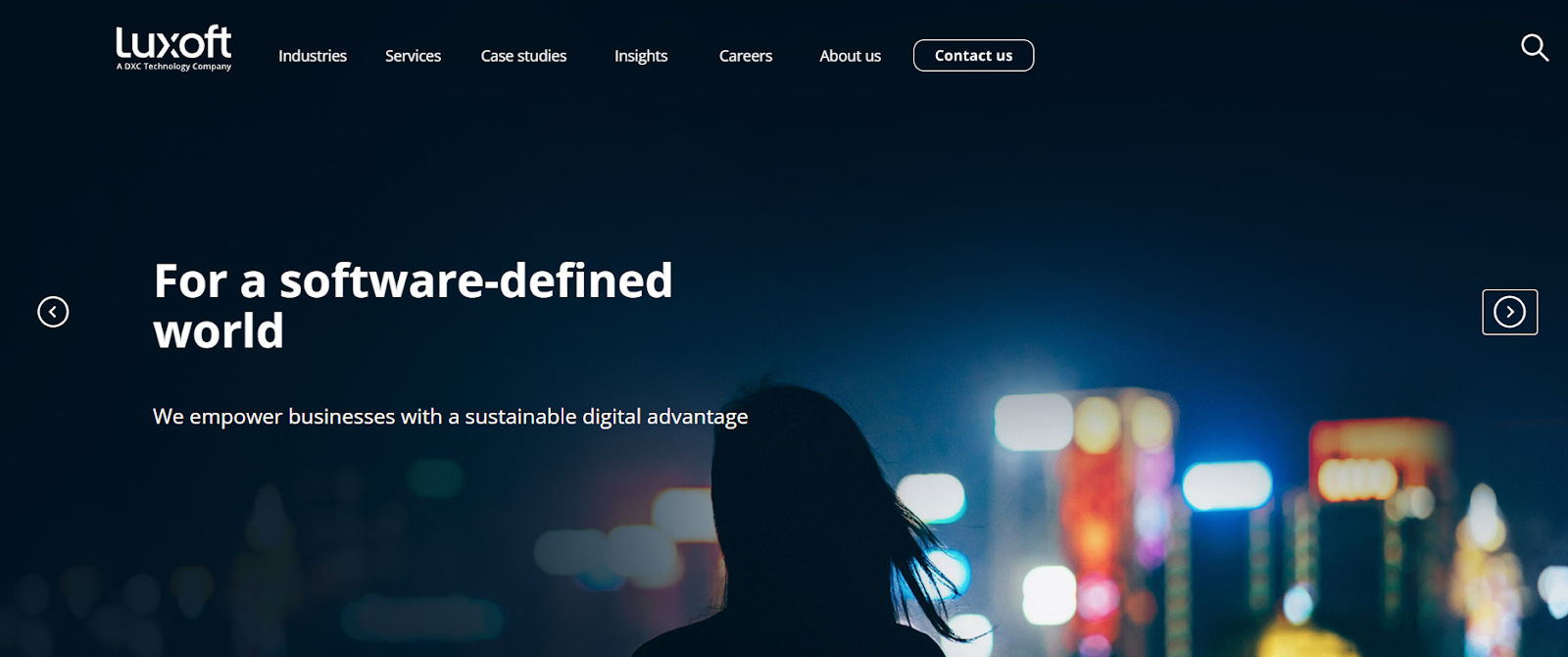
Luxoft is a software development company based in Zug, Switzerland. Today, it’s a part of DXC Technology. They have more than 17,000 employees and 425+ clients. Luxoft provides enterprise solutions for financial services, automotive, and healthcare, with main delivery centers in Poland, Ukraine, and India. Their core expertise focuses on software engineering, legacy modernization, intelligent automation, cloud solutions, data analytics, and more.
Cultural alignment & DACH presence: Luxoft has offices in 29 countries and 57 cities, including Berlin, Stuttgart, and Munich. So, it’s no wonder they’ve worked on projects in the DACH region. One example is a client onboarding and KYC platform for a major Swiss bank. Most of the development process, however, happens outside DACH, where client-facing teams in DACH coordinate with large offshore delivery centers.
Regulatory compliance capability: Luxoft holds ISO/IEC 27001, SOC 1, and SOC 2 certifications. Their processes follow strict data security and privacy standards, fully aligned with GDPR. However, distributed operations across multiple countries might complicate data sovereignty guarantees compared to DACH-focused providers.
Project ownership model: The company offers three types of managed delivery engagement based on how much ownership you want. You can retain most of the delivery responsibility, let Luxoft manage a specific app and gradually hand control back, or have them handle an entire set of applications.
Speed & delivery methodology: The company provides stable and efficient results with modern delivery processes, robust knowledge management solutions, and deep expertise. But they don’t provide specific details about their delivery methodology.
Cost structure & value: The company doesn’t specify how they manage to keep their costs competitive, but with dev teams in different countries, there’s room for some cost savings.
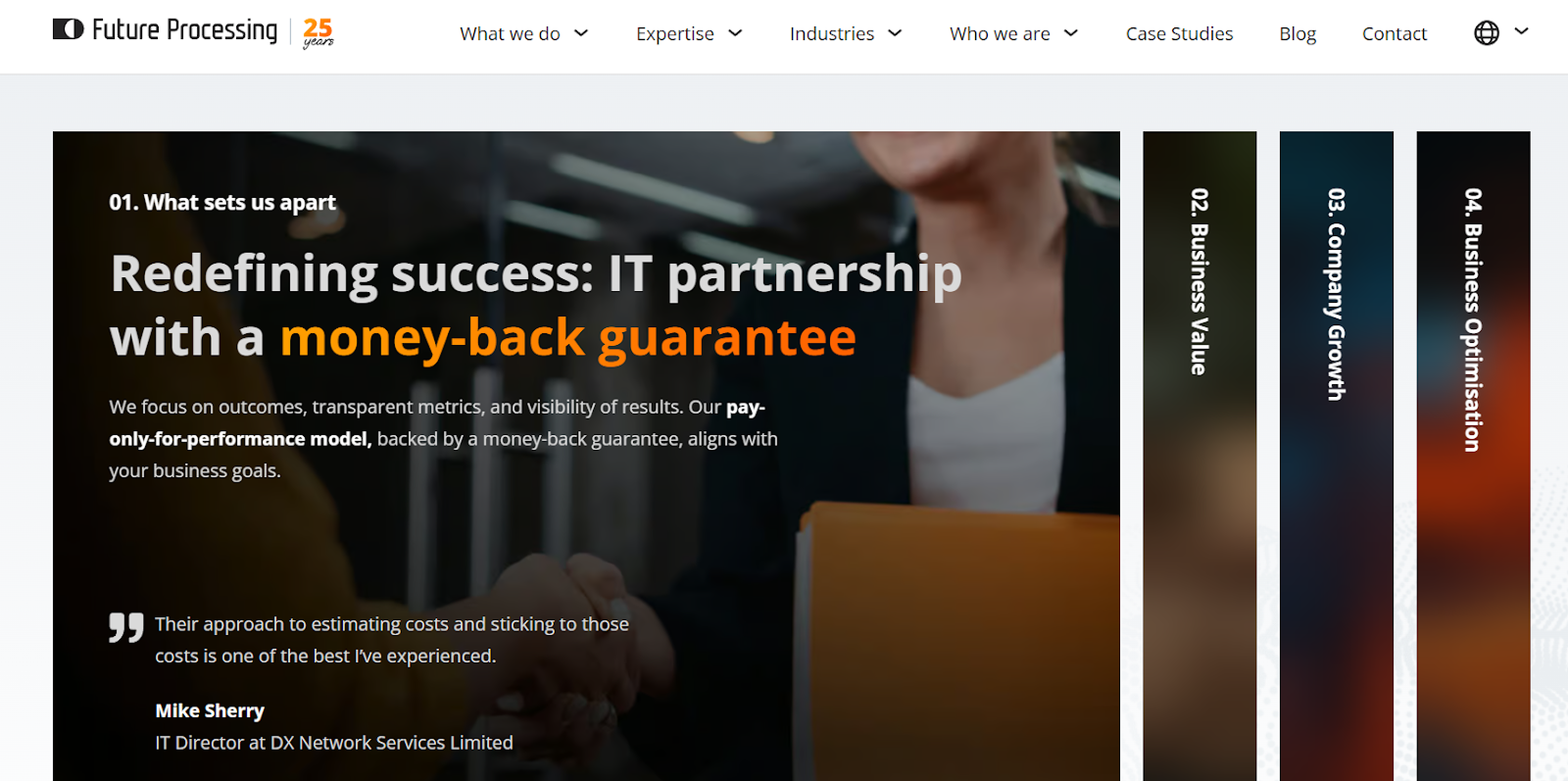
Future Processing is a technology consultancy and software development company with 25 years of experience. It provides full-cycle software development services to clients in finance, healthcare, media, and manufacturing. The company’s service portfolio includes custom software development, cloud consulting and cloud migration, data integration, AI adoption, and more.
Future Processing has delivered over 900 projects, but let’s take a closer look to see how they fit for DACH enterprises.
Cultural alignment & DACH presence: Future Processing is headquartered in Poland, but it has 5 more offices globally, with Germany and Switzerland on the list. Plus, their website features 5 successful projects from Switzerland, 7 from Germany, and 1 from Austria. So they do have experience working in the DACH environment.
Regulatory compliance capability: Future Processing holds general industry certifications, like ISO 9001 and ISO 27001. They also align with GDPR, NIS2, and the AI Act.
Project ownership model: At Future Processing, outcomes matter most. They provide transparent metrics and operate on a pay-for-performance model, so accountability for results rests entirely on their shoulders.
Speed & delivery methodology: The company combines Agile methodology and proven frameworks to reduce risk and accelerate time-to-market. For example, they have internal project evaluation frameworks, such as 12 Delivery Success Indicators and team & process optimisation methods, that help maximize value for their clients.
Cost structure & value: Future Processing adapts pricing to various clients and their specific needs. Fixed-scope projects use a Fixed Price, evolving projects go with Time & Materials, and their Subscription Model gives ongoing access to top talent. They also tie fees to performance and reduce fees if objectives aren’t achieved.
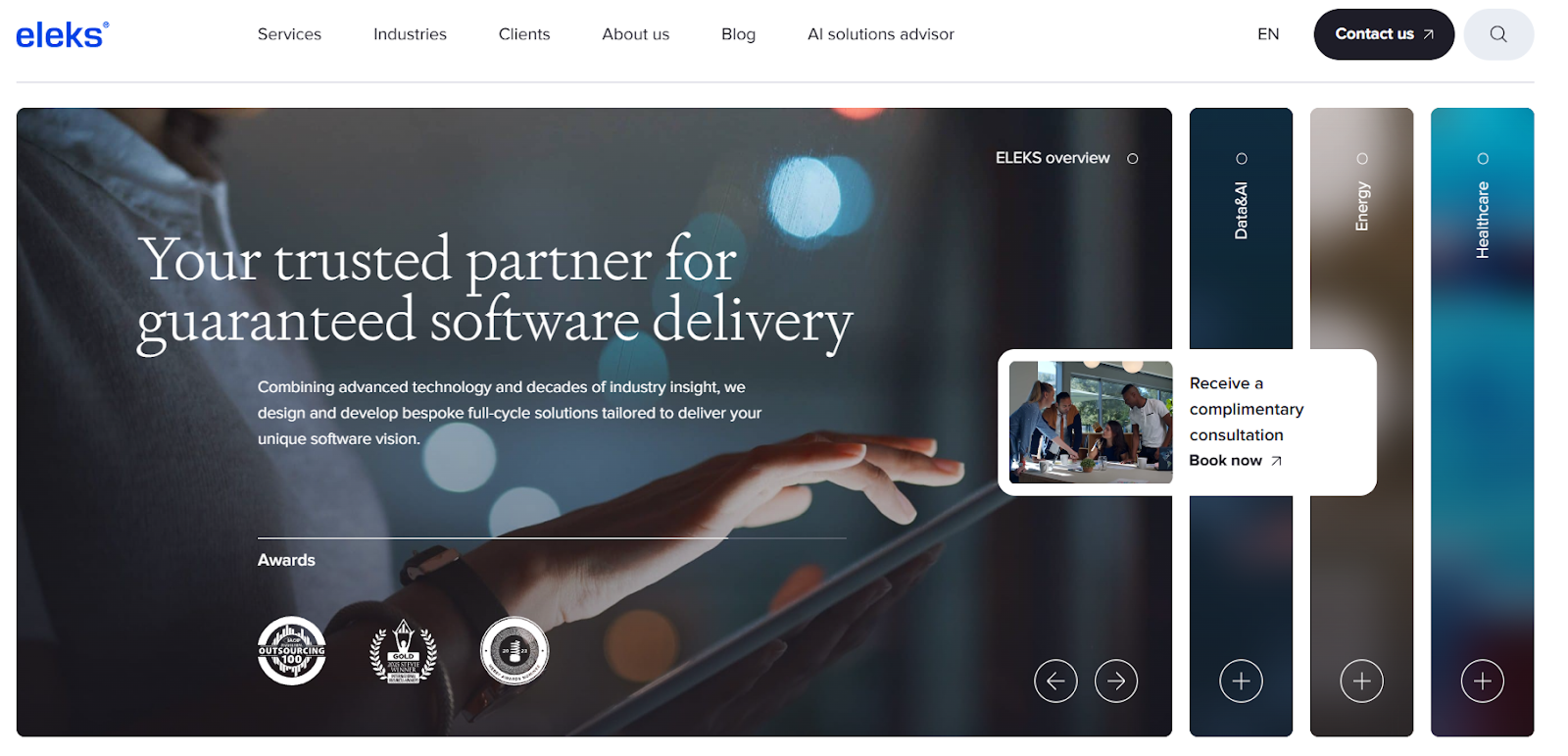
Eleks is a software development company based in Estonia and has over 20 offices on 3 continents. The company provides end-to-end services, including custom software development, web and mobile app development, cloud migration, DevOps, AI and machine learning, enterprise app development, cybersecurity, and UX/UI design. Eleks don't stop here. They also have products. Among their offerings is eCAP (a solution for seamless compliance) and a smart medical information system.
Cultural alignment & DACH presence: Eleks has an international office in Switzerland and Germany, but they don’t share specific details about their experience with DACH enterprise clients. Yet, they employ German-speaking professionals to act as contacts for clients in the region.
Regulatory compliance capability: Eleks has achieved ISO 9001:2025 and ISO 27001:2022 certifications, which shows a commitment to quality management and information security. Additionally, the company has validated its security practices with the SOC 2 Type II audit. Eleks’ eCAP helps companies automate and manage compliance with standards such as ISO 27001, SOC 2, GDPR, and HIPAA.
Project ownership model: The official website doesn’t share information about their ownership model or DACH-based product owners. However, they provide full-cycle software development services for many clients operating in the DACH region, for example, SafeSide Life AG, and 90% of their clients do more than one project with Eleks.
Speed & delivery methodology: Eleks takes a product-oriented delivery approach where they focus on the real business impact of the product they build, not just whether it sticks to the original scope.
Cost structure & value: The company offers flexible engagement models to suit different projects. They have a fixed price for well-defined scopes, time & material with a budget cap for evolving requirements, and time & material with SLAs (Service Level Agreement) for performance-focused work.
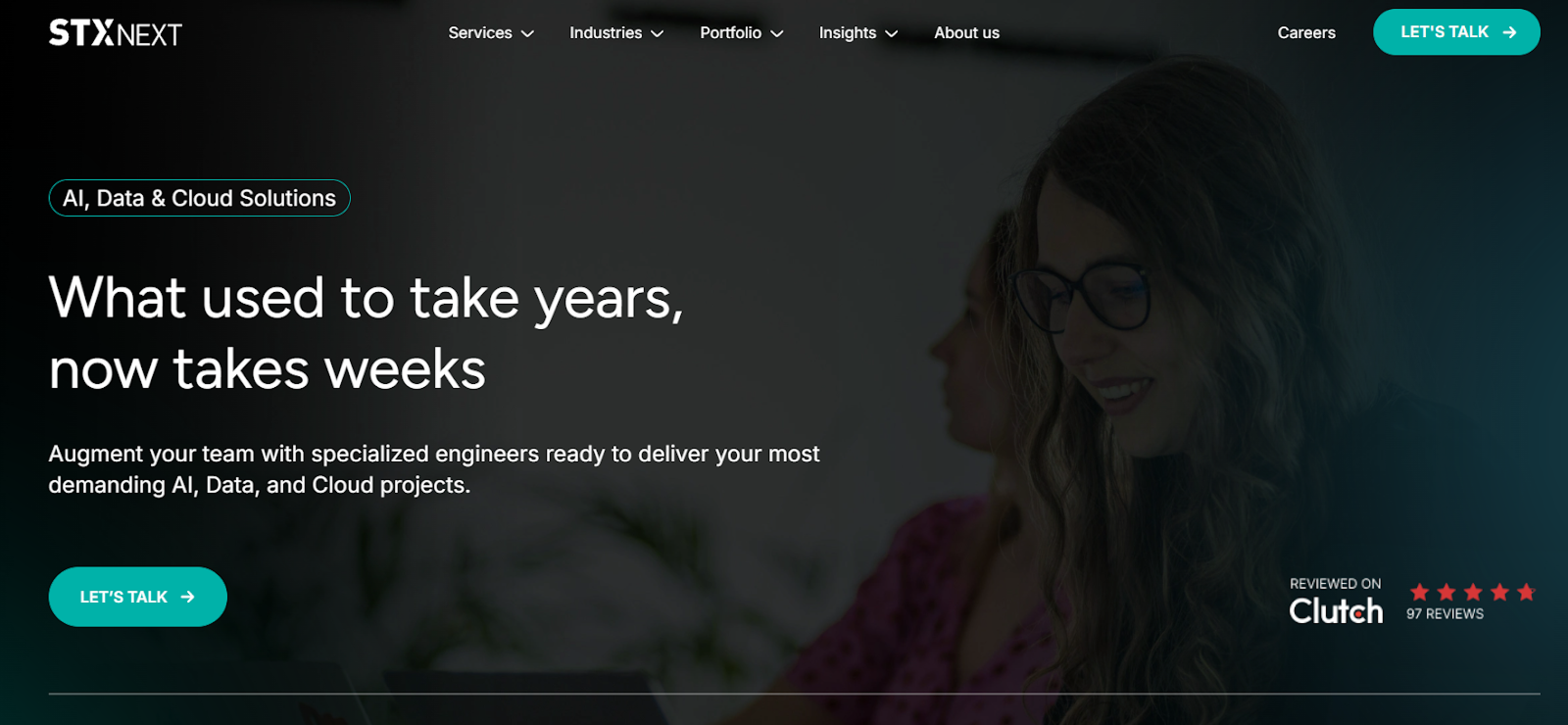
STX Next is a Poland-based company with offices in the United Kingdom, Germany, the United States, and a delivery center in Mexico. Their team counts over 500 engineers skilled in Python, Node.js, and other tech. The company specializes in AI and machine learning, cloud services, data engineering, as well as mobile and web application development. STX Next is an official Amazon Web Services (AWS) partner that helps deliver innovative technology to its clients.
Cultural alignment & DACH presence: STX Next has an office in Germany, but they are not physically present in Austria or Switzerland. The company has appointed a DACH Managing Director, so we can claim that the company has a strategic focus on the region.
Regulatory compliance capability: The company has a firm focus on security and compliance with ISO 27001 and GDPR. Their processes also meet TISAX, an information security standard and assessment program for the automotive industry. However, there is no specific mention of data residency guarantees in Swiss or EU data centers.
Project ownership model: Along with product designers, tech consultants, developers, QA engineers, and Scrum masters, STX Next provides product owners who are responsible for the project outcome. On top of that, about 68% of their team has gone through structured training and certification programs with AWS, Snowflake, Microsoft Azure, and Google Cloud.
Speed & delivery methodology: STX Next builds its delivery around three pillars: business-driven decisions, continuous delivery, and disciplined project governance. It aligns with proven delivery practices, but it doesn’t highlight any extra advantages for DACH enterprises.
Cost structure & value: STX Next doesn’t publicly explain its cost structure, but you can engage with the company in three ways. They offer consulting services, end-to-end product development, and team extension. Besides, they claim they’ll augment your team in no more than 14 days.
All six companies can build decent software. The difference is in how well they get the DACH business environment before issues pop up. If compliance and security keep you awake at night, go for a partner with DACH-based product owners and local data hosting. If not, broader European teams might be a viable choice. Map out your biggest risk and choose the partner that covers it best.
Not sure which risks to prioritize? Book a call and we'll tell you honestly whether Modeso fits, even if the answer is no.
